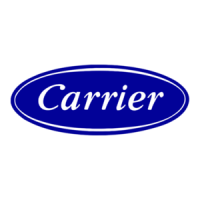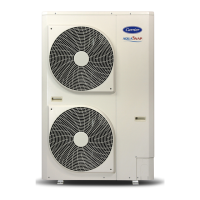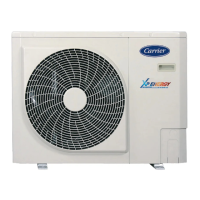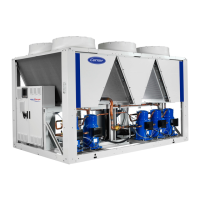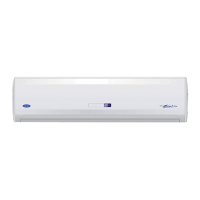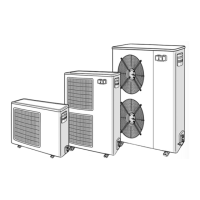Do you have a question about the Carrier 30AWH006HB and is the answer not in the manual?
Detailed technical data for each model, including electrical, compressor, and fan specs.
Provides overall dimensions (A, B, C, D, E, F, G, H, L) for different models.
Outlines general safety rules, illustrated marks, user responsibilities, and unit handling guidelines.
Detailed safety instructions for installation and operation, including refrigerant handling.
Information on the properties and handling of R-410A refrigerant used in the units.
Guidelines for safe and correct electrical connections, including warnings.
Graphs and voltage limits for cooling and heating operations based on outdoor air temperature.
Recommendations for selecting an appropriate installation site, considering clearances and environmental factors.
Diagrams showing required air clearances around the unit for optimal operation and safety.
Steps for preparing the unit before installation, including opening knockouts and removing panels.
Details on connecting the water circuit, including hydronic module features and specifications.
Schematic diagrams illustrating water circuit configurations for H and X/NX versions.
Diagrams showing the refrigerant circuit components and their connections.
Specifications for power supply, voltage range, current, fuses, and cables.
Wiring diagrams for connecting remote controls and auxiliary devices to terminal blocks.
Procedure and wiring for connecting an external heat source to the unit.
Procedure and wiring for controlling a dehumidifier or humidifier via the unit.
Configuration and operation of the silent/night mode to reduce noise levels.
Wiring and logic for controlling an additional water pump based on OAT and NUI codes.
Illustrates typical heating applications including space heating and sanitary hot water.
Tables detailing heating and cooling capacities, COP, EER, and LWA for various models.
Detailed wiring diagrams for inverter and GMC control sizes.
Overview of the control units and their physical locations within the system.
Explains the control logic based on GMC platform and user interfaces.
Describes the main flow of unit control logic, including inputs, mode control, and protections.
Details on selecting operating modes (Cooling, Heating, Off) and defining water set points.
Algorithm to prevent frequent compressor starts and stops, ensuring minimum run time.
Measures taken to prevent heat exchanger freezing by monitoring water temperatures.
Defines the function of output J7 Pin 2 for alarm, Tair setpoint, and other signals.
Logic for controlling the main water pump, including ON/OFF conditions and delays.
How the unit manages an external heat source based on OAT and LWT, including NUI codes.
Procedure for testing unit outputs using NUI code 104.
Explanation of the PMV's role in refrigerant superheating and its control mechanism.
Control routine to manage compressor frequency when discharge temperature increases.
Control of output frequency and voltage based on detected AC current.
Details on fan tap revolutions and cooling fan control logic based on temperature and speed.
Procedure for coil heating control, including compressor warm-up process and sensor functions.
Identifies inverter alarms through LED indications and error codes on the control PC board.
Lists specific error codes and their causes for 30AWH012 models.
Details error codes and their meanings for 30AWH015 models, using LED and DIP switch indicators.
Explains how to identify GMC board errors using LED flashing patterns and fault codes.
Describes peripheral input and output devices connected to the GMC board, with specifications.
Troubleshooting steps for errors related to the enter water temperature sensor.
Troubleshooting steps for errors related to the refrigerant temperature sensor.
Troubleshooting steps for errors related to the GMC outdoor air sensor.
Troubleshooting steps for communication loss between NUI and GMC board.
Troubleshooting steps for errors with the NUI room sensor.
Troubleshooting guide for flow switch and water pump errors, including noise and blockage issues.
Troubleshooting steps for communication loss over the RS485 interface.
Troubleshooting steps for signal loss originating from the inverter board.
Troubleshooting steps for errors related to the inverter's air sensor.
Troubleshooting for G-Tr short-circuit protection, including power supply and relay checks.
Troubleshooting steps for issues with the inverter's current sensor.
Troubleshooting for errors with heat exchanger sensors TE and TS.
Troubleshooting steps for outdoor fan motor errors and compressor lock conditions.
Troubleshooting steps for compressor lock issues, checking functionality and sensors.
Troubleshooting steps for discharge temperature errors, checking charge and sensor resistance.
Troubleshooting steps for compressor breakdown, checking voltage, current, and P.C. boards.
Troubleshooting for high temperature release faults, checking unit operation and voltages.
Graphs showing the relationship between temperature sensor resistance and actual temperature.
Table listing resistance values and reference temperatures for key components like PMV, 4-Way valve, and fans.
Overview of how dry contacts are used to control unit functions via user interfaces.
Installation guide for the 33AW-RC1 wired remote controller, including mounting and wiring.
Details on input/output features and their functions with specific NUI codes.
Configuration settings for various unit functions like mode, ECO, night mode, and SHW.
Installation instructions for the 33AW-CS1 thermostat, including location and wiring recommendations.
Lists the main user functionalities and comfort settings available on the interface.
Explanation of icons displayed on the user interface for various modes and statuses.
Identifies and explains the function of the buttons on the user interface.
A table listing NUI codes, their names, descriptions, value ranges, and standard settings.
Pre-set and custom heating/cooling curves relating water temperature to outdoor temperature.
Procedure for checking and charging refrigerant, including important safety notes.
Instructions for cleaning the unit's coil and fan blades to maintain performance.
Step-by-step procedures for replacing common parts like common procedure, side cabinet, and air-outlet cabinet.
A checklist of annual inspection tasks for maintaining the unit's performance and safety.
Performance data (Capacity, COP) for Size 004 models across various outdoor temperatures and frequencies.
Performance data (Capacity, COP) for Size 004 cooling models at different outdoor temperatures and frequencies.
Performance data (Capacity, COP) for Size 006 heating models across various outdoor temperatures and frequencies.
Performance data (Capacity, COP) for Size 006 cooling models at different outdoor temperatures and frequencies.
Performance data (Capacity, COP) for Size 008 heating models across various outdoor temperatures and frequencies.
Performance data (Capacity, COP) for Size 008 cooling models at different outdoor temperatures and frequencies.
Performance data (Capacity, COP) for Size 012 heating models across various outdoor temperatures and frequencies.
Performance data (Capacity, COP) for Size 012 cooling models at different outdoor temperatures and frequencies.
Performance data (Capacity, COP) for Size 015 heating models across various outdoor temperatures and frequencies.
Performance data (Capacity, COP) for Size 015 cooling models at different outdoor temperatures and frequencies.
General information regarding refrigerants, R-410A, and environmental considerations.
| Brand | Carrier |
|---|---|
| Model | 30AWH006HB |
| Category | Air Conditioner |
| Language | English |
